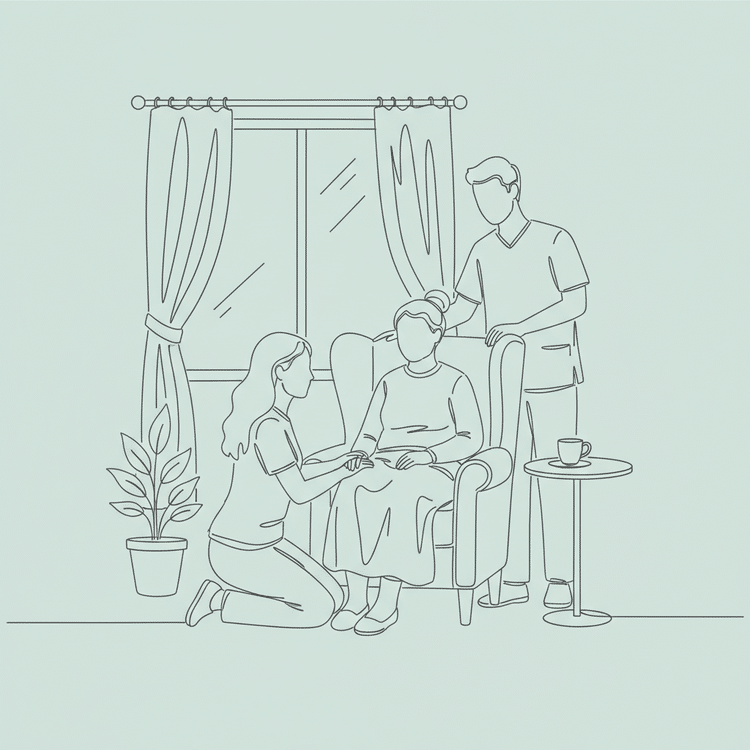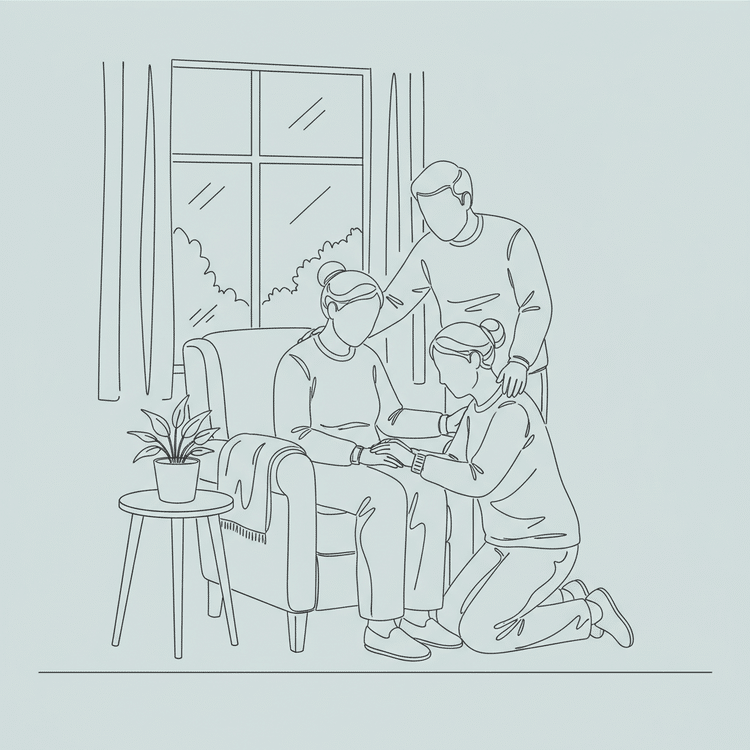For nurses seeking a career that combines clinical expertise with deep human connection, hospice nursing offers one of the most meaningful and rewarding paths in healthcare. As a hospice care nurse, you’ll have the opportunity to make a profound difference in patients’ lives during their most vulnerable moments while supporting families through one of life’s most challenging transitions.
With the aging population in Ohio, Indiana, and Pennsylvania, the need for skilled hospice nurses is greater than ever, offering rewarding opportunities for those seeking to make a difference in their local communities.
Hospice nursing is far more than medical care—it’s about preserving dignity, providing comfort, and ensuring that patients and families experience peace during end-of-life care. This specialized field attracts nurses who understand that healing doesn’t always mean curing, and that sometimes the greatest gift we can offer is compassionate presence.
What Does a Hospice Nurse Do?
Hospice nursing encompasses a unique blend of clinical skills, emotional intelligence, and family-centered care that sets it apart from other nursing specialties.
Clinical Responsibilities
Pain and symptom management forms the cornerstone of hospice nursing practice. Hospice nurses become experts in comfort care, developing sophisticated skills in assessing and managing complex symptoms including pain, nausea, shortness of breath, and anxiety. This expertise requires deep understanding of pharmacology, particularly regarding opioid management, adjuvant medications, and non-pharmacological comfort measures.
Wound care and infection prevention often become crucial for hospice patients, requiring nurses to adapt traditional healing approaches to focus on comfort rather than cure. This might involve managing pressure ulcers, surgical sites, or chronic wounds. The primary goal is to prevent infection and reduce discomfort.
Medication management in hospice requires specialized knowledge, as nurses must understand how disease progression affects drug metabolism and absorption. They also educate families about medication administration, side effects to monitor, and when to contact the hospice team.
Patient and Family Support
Patient advocacy takes on special meaning in hospice care, where nurses help patients express their wishes, maintain autonomy, and preserve dignity throughout their care journey. This advocacy extends to ensuring cultural and spiritual preferences are honored and that patients maintain as much control as possible over their care decisions.
Family education and support represents a significant portion of hospice nursing, as nurses teach family members how to provide basic care, recognize changes in condition, and cope with the emotional challenges of watching a loved one decline. This educational role requires exceptional communication skills and emotional intelligence.
Crisis intervention skills become essential, as hospice nurses often respond to urgent situations where patients experience symptom exacerbations or families feel overwhelmed. The ability to provide calm, competent care during these moments can dramatically improve the overall hospice experience.
The Emotional Rewards of Hospice Nursing
While hospice nursing involves supporting people through death and dying, it offers unique emotional rewards that many nurses find deeply fulfilling.
Making a Lasting Impact
Meaningful connections develop quickly in hospice care because of the intensive, personal nature of end-of-life support. Nurses often describe the privilege of being invited into families’ most intimate moments and the honor of helping patients achieve peaceful deaths. These connections, while brief, can be profoundly meaningful for both nurses and families.
Witnessing strength and resilience becomes a daily experience for hospice nurses, who see patients and families demonstrate remarkable courage, grace, and love in the face of terminal illness. This exposure to human resilience often strengthens nurses’ own perspective on life and death.
Facilitating healing moments is a regular part of hospice care, where nurses help create opportunities for patients and families to resolve conflicts, express love, and find closure. Being part of these healing moments provides deep professional satisfaction that extends far beyond traditional medical outcomes.
Professional Growth and Learning
Advanced clinical skills develop rapidly in hospice nursing, as the complexity of symptom management and the autonomy of practice push nurses to expand their clinical knowledge and decision-making abilities. Many hospice nurses describe significant growth in their assessment skills, critical thinking, and clinical confidence.
Communication expertise flourishes in hospice nursing, where difficult conversations are daily occurrences. Nurses develop sophisticated skills in discussing prognosis, explaining complex medical information, and supporting families through grief and anticipatory loss.
Spiritual and philosophical growth often occurs through exposure to diverse beliefs about death, dying, and meaning. Many nurses find that hospice work deepens their own spiritual understanding and helps them develop greater peace with life’s uncertainties.
Work-Life Balance in Hospice Nursing
One of the most attractive aspects of hospice nursing for many professionals is the potential for improved work-life balance compared to traditional hospital nursing.
Schedule Flexibility
Autonomous scheduling characterizes much of hospice nursing, where nurses often have flexibility in organizing their daily visits and managing their caseloads. This autonomy allows for better integration of personal and professional responsibilities.
Predictable hours are more common in hospice care, with most positions offering regular day shifts and limited weekend or holiday requirements. While on-call responsibilities exist, they’re typically shared among team members and don’t require the constant presence that hospital nursing demands.
Remote work elements include documentation that can often be completed from home, reducing time spent in healthcare facilities and allowing for more efficient use of work hours.
Reduced Physical Demands
Less physically demanding than many nursing specialties, hospice nursing typically involves less lifting, transferring, and physical strain. While mobility assistance may be needed, the focus on comfort care rather than aggressive interventions often means less physical stress on nurses.
Calmer environment characterizes most hospice settings, whether in homes, facilities, or hospice centers. The atmosphere tends to be more peaceful and less chaotic than acute care settings, contributing to reduced job stress.
Manageable caseloads in well-run hospice programs ensure that nurses can spend adequate time with each patient and family, reducing the rushed feeling common in other healthcare settings.
Career Advancement Opportunities
Hospice nursing offers numerous pathways for professional growth and specialization.
Certification and Specialization
Certified Hospice and Palliative Nurse (CHPN) certification through the Hospice and Palliative Credentialing Center provides formal recognition of expertise and often leads to salary increases and advancement opportunities. According to the National Hospice and Palliative Care Organization (NHPCO), certification requirements and scope of practice may differ by state.
For state-specific licensing and continuing education requirements, nurses should consult their state nursing boards: Ohio Board of Nursing, Indiana State Board of Nursing, or Pennsylvania State Board of Nursing.
Pain management specialization allows nurses to develop expertise in complex pain and symptom management, potentially leading to consultant roles or specialized practice positions.
Bereavement support training opens opportunities to provide grief counseling and support services, expanding the nurse’s role beyond direct patient care to include ongoing family support.
Leadership Pathways
Leadership opportunities often arise for experienced hospice nurses, including charge nurse positions, preceptor roles, and clinical mentorship opportunities.
Program development opportunities exist for nurses interested in developing new hospice services, quality improvement initiatives, or community outreach programs.
Education and training roles allow experienced hospice nurses to educate new staff, develop educational programs, or provide community education about hospice care.
Addressing Common Concerns About Hospice Nursing
Many nurses considering hospice care have legitimate questions and concerns about this specialty.
Dealing with Death and Grief
Professional boundaries help hospice nurses maintain emotional health while providing compassionate care. Training in grief support, self-care strategies, and professional support systems helps nurses process the emotional aspects of their work.
Finding meaning in loss becomes easier with experience, as nurses learn to focus on the comfort provided, the dignity preserved, and the peaceful deaths facilitated rather than viewing death as failure.
Support systems in hospice organizations typically include employee assistance programs, grief counseling, and peer support groups specifically designed to help staff process the emotional demands of end-of-life care.
Clinical Preparedness
Orientation programs in hospice nursing are typically comprehensive, covering symptom management, family dynamics, communication skills, and emergency procedures. Most organizations provide extensive mentorship during the transition period.
Continuing education requirements ensure that hospice nurses stay current with best practices in pain management, end-of-life care, and family support techniques.
Interdisciplinary support means hospice nurses work closely with physicians, social workers, chaplains, and other specialists, providing multiple resources for clinical questions and complex situations.
Compensation and Benefits
Hospice nursing offers competitive compensation packages that often include benefits beyond salary.
Salary Considerations
Competitive wages in hospice nursing often match or exceed those in other nursing specialties, particularly when considering the improved work-life balance and reduced physical demands. Medicare hospice benefits provide stable funding for hospice organizations, contributing to competitive compensation packages.
Mileage reimbursement for travel to patient homes typically provides additional compensation that can be significant for nurses covering large geographic areas.
Flexible benefits packages often include health insurance, retirement planning, paid time off, and professional development funding.
Professional Development Investment
Education funding for continuing education, certification programs, and conference attendance demonstrates organizational commitment to professional growth.
Career pathway support includes mentorship programs, leadership development opportunities, and support for advanced education in nursing or related fields.
Regional networking opportunities through local hospice organizations can provide valuable professional connections and continuing education. Joining organizations such as the Ohio Hospice and Palliative Care Organization, Indiana Hospice & Palliative Care Organization, or Pennsylvania Hospice Network offers networking, education, and professional support specifically for hospice professionals in these states.
Making the Transition to Hospice Nursing
For nurses considering a move to hospice care, several factors can help ensure a successful transition.
Essential Skills and Qualities
Clinical competence in basic nursing skills provides the foundation, but hospice nursing also requires strong assessment abilities, critical thinking skills, and comfort with autonomous decision-making.
Emotional intelligence and communication skills are crucial for successful hospice nursing, as the ability to connect with patients and families often determines the quality of care provided.
Cultural sensitivity becomes important in hospice care, where nurses encounter diverse beliefs about death, dying, and grief that must be respected and incorporated into care plans.
Preparation Strategies
Volunteer experience with hospice organizations can provide valuable exposure to end-of-life care and help nurses determine if this specialty aligns with their interests and values.
Educational preparation through courses in palliative care, grief counseling, or pain management can strengthen applications and improve confidence in hospice nursing roles.
Networking with current hospice nurses can provide insight into daily realities, job satisfaction, and potential challenges in hospice nursing practice.
Finding Your Place in Hospice Nursing
Hospice nursing offers a unique opportunity to combine clinical expertise with compassionate care in a setting that values relationship-building, dignity, and comfort. For nurses seeking meaningful work that makes a lasting difference in patients’ and families’ lives, hospice nursing provides a career path that is both professionally rewarding and personally fulfilling.
The growing need for hospice services, combined with an aging population, ensures strong job security and opportunities for career growth. More importantly, hospice nursing offers the chance to practice nursing at its most fundamental level—providing comfort, preserving dignity, and supporting families through life’s most challenging moments.
At ViaQuest Hospice, we understand that hospice nursing requires special individuals with both clinical competence and compassionate hearts. Our comprehensive orientation programs, ongoing education opportunities, and supportive team environment help nurses transition successfully into hospice care while maintaining healthy work-life balance.
ViaQuest Hospice is proud to serve communities across Ohio, Indiana, and Pennsylvania, and we’re actively seeking compassionate nurses to join our team.
Ready to explore a meaningful nursing career in hospice care? Visit our careers page to view current nursing opportunities in Ohio, Indiana, and Pennsylvania, learn about our benefits and workplace culture, and discover how you can make a difference in patients’ and families’ lives through compassionate hospice nursing.





